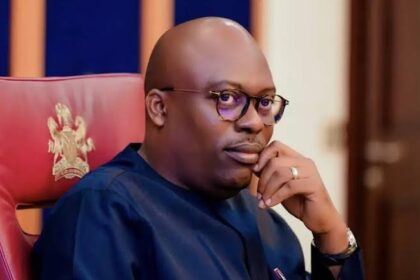Vice-President Yemi Osinbajo on Friday said a past administration withdrew N60bn from the Central Bank of Nigeria in one day with no one knowing the whereabouts of the money.
Osinbajo stated this in Lagos where he inaugurated an independent power project built by a private developer, Solad Power Holdings, under the Federal Government’s Energising Economies Initiative, for the Sura Shopping Complex.
He described Micro, Small and Medium Enterprises as the future of the Nigerian economy, adding that the government must support them.
Osinbajo said, “The only way for us to grow our country is to give the hardworking people of our country the facilities to run their businesses, whether it is power or money. That is why we are going all across the country to provide the resources that are necessary for our people to actually get to work.
“After inaugurating this today, we are going to ensure that we continue to increase the capacity across the whole country so that many more people are able to do their businesses.
“Sometimes we have to stop and ask ourselves: Is our country able to provide enough for all of us? Does this country have the capacity to provide for all its citizens? I think we have the capacity; the only problem is that we, as individuals, must also be able to say that we will not stand for people stealing the resources of this country.”
According to him, corruption is the biggest problem facing Nigeria.
“In one day, one government withdrew N60bn from the central bank and nobody, till this moment, can tell where it went. One government in this country withdrew $292m in one day,” the Vice-President stated.
The Minister of Power, Works and Housing, Mr Babatunde Fashola, said the previous administration promised that every Nigerian would have access to electricity after the privatisation of the power sector.
The President Goodluck Jonathan administration privatised the power sector and handed over the successor electricity generation and distribution companies carved out of the defunct Power Holding Company of Nigeria to private investors on November 1, 2013.
Fashola stated that the entire power structure had been sold by the time President Muhammadu Buhari was elected into office.
“And those who sold it told us that once they privatised, everybody would have electricity. But Sura market did not get and so did many other Nigerians. What it meant was simply that there was a lot of work to be done, and that is the work that the current administration has undertaken,” he added.
The minister noted that when Buhari assumed office, some people told him to cancel the privatisation and take the contracts that the Discos had away from them.
“But some of your (Buhari’s) advisers told you not to do it, that privatisation will work but it will work with policies, with support from the government, and it is one of those policies, the mini grid policy, that has brought us here today,” he noted.
Fashola said with the mini grid policy, the current government had democratised access to power, giving the people the right to choose.
According to him, over 1,000 shops in the Sura Shopping Complex have started enjoying regular electricity, adding, “For me, this is success; this is progress, and there is still much more to do.”
The 1.5 megawatts IPP takes excess power from the Lagos Island Independent Power Plant and supplies electricity to the Sura Shopping Complex, according to the Rural Electrification Agency.


